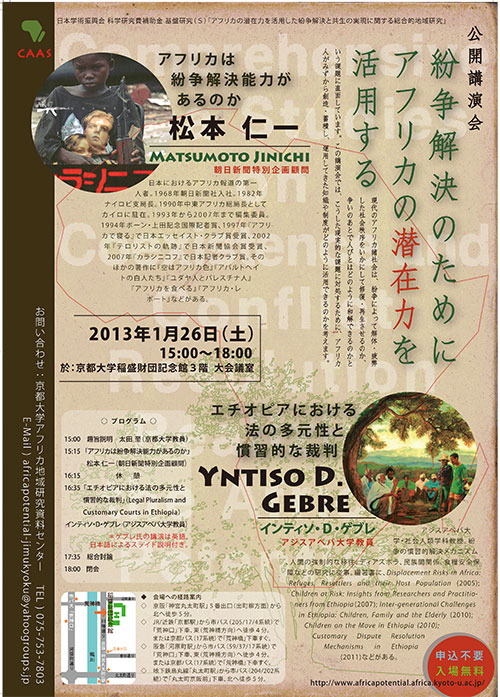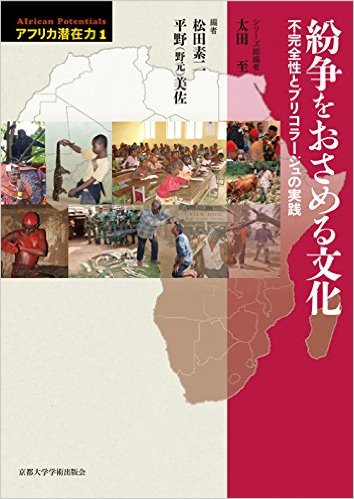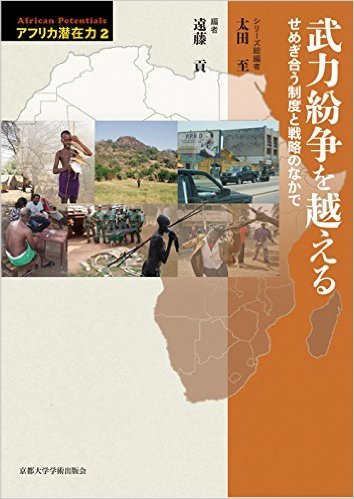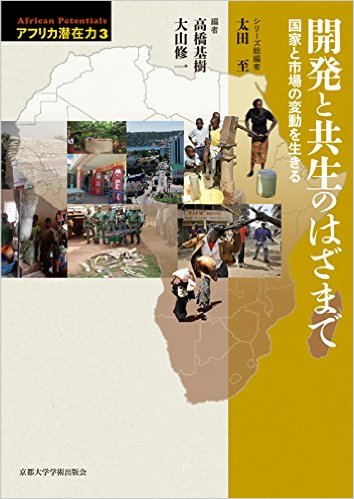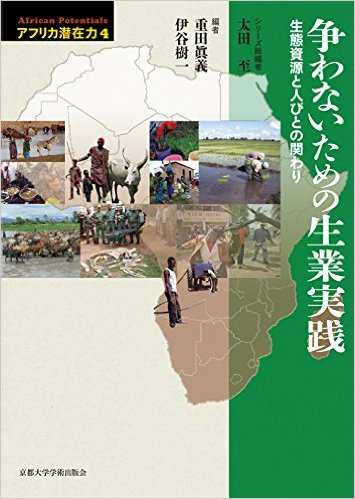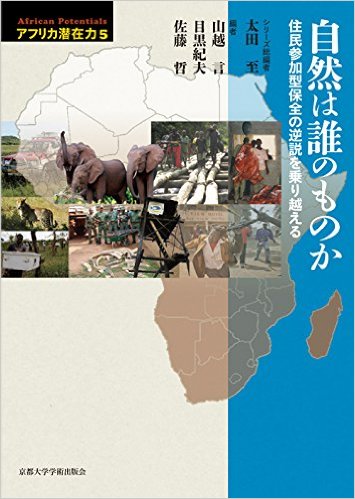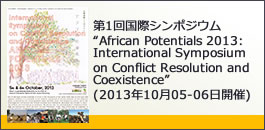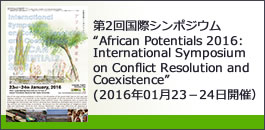[第12回公開ワークショップ/社会・文化ユニット第9回研究会]Wilbert Zvakanyorwa Sadomba「The Urban Working Class Dimensions of Zimbabwe’s War Veterans Revolution: New Empirical Evidence from the Informal Sector」(第12回Kyoto University African Studies Seminar (KUASS)との共催、2013年03月19日開催)
日時:2013年3月19日 (火) 16:00~18:00
場所:京都大学稲盛財団記念館3階小会議室2
題目:「The Urban Working Class Dimensions of Zimbabwe’s War Veterans Revolution: New empirical evidence from the informal sector」
発表者:Dr. Wilbert Zvakanyorwa Sadomba (Department of Sociology, University of Zimbabwe)
要旨
The revolution that has been spearheaded by Zimbawean veterans of the 1970s guerrilla war has pushed Africa’s political, social and economic struggles to new horizons. It raises fresh philosophical questions about postcoloniality of and in Africa. The revolution, rooted as it is in the liberation struggle that culminated in a protracted war from the1960s to 1979, lay a political foundation that continues to shape philosophical thought and social practice of this small nation, with ripple effects on the whole continent and perhaps other developing nations across the world. The essence of this revolution is its combined challenge of neo-colonialism and imperialist domination supported by settler economic hegemony. There are four distinct rural and urban movements on which this revolution was anchored, viz. the land, informal mining, housing cooperatives and informal industry and trade movements. A combination of the two books focus on the land and housing cooperatives. Of the five the land movement was the most popularised and internationalised but it was by no means the most dramatic or even the most sustainable but on the contrary it was the most vulnerable to neo-colonial forces and imperialist attacks. However it was also the most symbolical. Current studies on the informal industrial movement add more empirical evidence to this theorisation. Future studies will pursue informal mining as part of the war veterans revolution. The address will illustrate how the war veteran revolution generated a centrifugal force that span the movements and it will discuss relative successes and failures of these in the current political stalemate of the country.(※講演は英語で行われます。日本語通訳および日本語資料はございません。事前申込不要/参加無料。どなたでもご参加いただけます。)
共催:
・京都大学アフリカ地域研究資料センター
・科研基盤(S)「アフリカの潜在力を活用した紛争解決と共生の実現に関する総合的地域研究」(代表者:太田至)
[社会・文化ユニット第8回研究会/第11回公開ワークショップ]Ronald Niezen「Human Rights NGOs and Strategies of Public Justice in Sub-Saharan Africa」(第11回Kyoto University African Seminarとの共催、2013年02月02日開催)
日 時:2013年2月2日(土)15:00〜17:00
場 所:京都大学稲盛財団記念館3階小会議室2
プログラム
15:00-17:00
Ronald Niezen (Department of Anthropology, McGill University)
ロナルド・ニーゼン(マギル大学)
“Human Rights NGOs and Strategies of Public Justice in Sub-Saharan Africa”
「サブサハラ・アフリカにおける人権NGOと公共的正義の戦略」
要旨
人間の権利を侵害する者の評判を落とすような告発や抗議運動は、国家を人権遵守の方向へと動かすために、もっとも大きな影響力をもつもののひとつである。このような「恥の政治」の効果やその結末は、NGOネットワークの性質や、正義を求めるロビー活動への参加のあり方によって、多様なかたちをとる。このことは、西アフリカのトゥアレグの主張や戦略と、ケニアのサンブル社会におけるウモジャ女性村のそれとを比較することでよく理解できるだろう。国際的な先住民運動がサブサハラ・アフリカでも展開されるようになってきたことは権利遵守が進む過程について考える機会を提供しているし、その過程は、遠く離れた場所にいる人びとを受け手とするトランスナショナルな公共的取り組みに影響を受けている。
The most significant influence on states that moves them in the direction of human rights compliance involves campaigns of public exposure and protest intended to apply reputational costs to violators of rights. The effectiveness and social consequences of these “politics of shame” vary considerably according to the nature of NGO networks and public participation in justice lobbying. This can be understood by comparison between the claims and strategies of the Tuareg in West Africa and those of the Umoja Women’s village among the Samburu of Kenya. The extension of the international movement of indigenous peoples into sub-Saharan Africa presents an opportunity to consider emerging processes of rights compliance, influenced by trans-national public engagement with distant public audiences.
[第11回公開ワークショップ/社会・文化ユニット第8回研究会]Ronald Niezen「Human Rights NGOs and Strategies of Public Justice in Sub-Saharan Africa」(第11回Kyoto University African Seminarとの共催、2013年02月02日開催)
日 時:2013年2月2日(土)15:00〜17:00
場 所:京都大学稲盛財団記念館3階小会議室2
プログラム
15:00-17:00
Ronald Niezen (Department of Anthropology, McGill University)
ロナルド・ニーゼン(マギル大学)
“Human Rights NGOs and Strategies of Public Justice in Sub-Saharan Africa”
「サブサハラ・アフリカにおける人権NGOと公共的正義の戦略」
要旨
人間の権利を侵害する者の評判を落とすような告発や抗議運動は、国家を人権遵守の方向へと動かすために、もっとも大きな影響力をもつもののひとつである。このような「恥の政治」の効果やその結末は、NGOネットワークの性質や、正義を求めるロビー活動への参加のあり方によって、多様なかたちをとる。このことは、西アフリカのトゥアレグの主張や戦略と、ケニアのサンブル社会におけるウモジャ女性村のそれとを比較することでよく理解できるだろう。国際的な先住民運動がサブサハラ・アフリカでも展開されるようになってきたことは権利遵守が進む過程について考える機会を提供しているし、その過程は、遠く離れた場所にいる人びとを受け手とするトランスナショナルな公共的取り組みに影響を受けている。
The most significant influence on states that moves them in the direction of human rights compliance involves campaigns of public exposure and protest intended to apply reputational costs to violators of rights. The effectiveness and social consequences of these “politics of shame” vary considerably according to the nature of NGO networks and public participation in justice lobbying. This can be understood by comparison between the claims and strategies of the Tuareg in West Africa and those of the Umoja Women’s village among the Samburu of Kenya. The extension of the international movement of indigenous peoples into sub-Saharan Africa presents an opportunity to consider emerging processes of rights compliance, influenced by trans-national public engagement with distant public audiences.
[第2回公開講演会/第9回全体会議]「紛争解決のためにアフリカの潜在力を活用する」(2013年1月26日開催)
日 時:2013年1月26日(土)15:00~18:00
場 所:京都大学稲盛財団記念館3階大会議室
プログラム
15:00~15:15 太田至(京都大学)「趣旨説明」
15:15~16:15 松本仁一(朝日新聞特別企画顧問)「アフリカは紛争解決能力があるのか」
16:15~16:35 休 憩
16:35~17:35 ゲブレ・インティソ(アジス・アベバ大学教員)「エチオピアにおける法の多元性と慣習的な裁判(Legal Pluralism and Customary Courts in Ethiopia)」
17:35~18:00 総合討論
要 旨
趣旨説明 太田至(京都大学)
現代のアフリカ諸社会は、紛争によって解体・疲弊した社会秩序をいかにして修復・再生させるのか、争いのあとで人びとはどのように和解できるのかという課題に直面しています。この講演会では、こうした現実的な課題に対処するために、アフリカ人がみずから創造・蓄積し、運用してきた知識や制度がどのように活用できるのかを考えます。
アフリカは紛争解決能力があるのか
松本仁一(朝日新聞特別企画顧問)
□結論からいうと「ある」
□例:ソマリランド(280万人)
・80年代半ば、内戦が始まる。1991年バーレ政権崩壊。
・ソマリランド内部の武力抗争は続く。約20の氏族。5万丁のカラシニコフ。
・93年、ボロマ地区の氏族長老が和平会議を呼びかけ。
・長老82人が銃を手放すことを呼びかける。民兵は警察と軍に。
・国連が注目。UNDPが銃回収方法を担当。
・02年までに民間の銃はほぼ回収。
・市場、女性ばかり。治安に信頼。
・ただ、ソマリランドは「単一民族国家」――共通の利害感覚を持てる。
□問題は多部族国家:コンゴ民主共和国、ウガンダ北部、チャド、ジンバブエ
・経済が崩壊――食えない――部族に依存――部族優位社会に。
・部族パトロンはクライアントを養うためにワイロを取る――国家経済崩壊へ
□多部族社会での対立解消は可能か――イエス。
・部族を超える価値観を持つこと。「独立闘争」の時代は部族対立は目立たなかった
・部族に頼らなくても食える社会。働けば食べられる社会がそれに代わる。
□政府に任せておいたらいつまでも「利益誘導型」でだめ
・「働けば食える」「もっと働けばもっといいことがある」のインセンティブを。
・ジンバブエのORAP。インセンティブを持つ。
・南アの対モザンビーク、対タンザニア投資。雇用と労働の質の向上。
・経済合理主義を民間主導で持ちこむ実験中。OSR。
□一筋縄ではいかない。しかしやってみる価値はある。
エチオピアにおける法の多元性と慣習的な裁判(Legal Pluralism and Customary Courts in Ethiopia)
インティソ・D・ゲブレ(アジス・アベバ大学)
エチオピアには法の多元性がある―通常の公式な裁判と非公式で慣習的な裁判の二つが併存しているのである。家族内で発生する問題は、公式な裁判以外の場で取り扱われることが多いし、また、イスラーム教徒同士の争いはイスラーム法に則した裁判所で審議されることが多い。これとは異なり、伝統的なメカニズムによって人びとのあいだの争いが解決されたとしても、それは国家の法によって承認されることがない。しかしながら最近の調査によれば、農村で生活する人びとの大部分は、紛争解決の手段として、公式な裁判よりも慣習的な裁判を好む傾向があり、それは、都市部に住む人びとの多くにもあてはまることが明らかになっている。
これまでは、慣習的な紛争解決のメカニズムは「遅れたものである」と考えられてきたし、そうした慣習を廃止して、明文化された近代的な法律に移行しなければならないとされてきた。しかしながら現在、こうした伝統的なメカニズムが妥当なものであることが認識されるようになった。そして近年には、国家の法律では解決しにくい紛争は慣習的な裁判によって処理することを、政府が推奨するケースが多くなっている。
しかし、慣習的な紛争解決のメカニズムにはいくつかの欠点がある。すなわち、人権侵害がおこったり、女性や若年層が審理のプロセスから排除されることが批判されている。そのために伝統的な裁判は、エチオピアが批准しているさまざまな国際的な手段とは調和しない、という議論がある。また、一部の地域では、殺人事件のような重大な犯罪が慣習的なシステムによって裁かれているし、村レベルの裁判によって死刑が求刑される事例もある。そのために非公式な裁判システムは、公式な裁判と衝突するようになる。
この講演では、伝統的な裁判が妥当である理由は何なのか、どうして伝統的な裁判が好まれているのかを説明する。そして、こうした傾向は好ましく見えるが、それはどのような意義をもつのか、また、慣習的な裁判を利用するためには、どのような課題があるのかを論ずる。
Legal Pluralism and Customary Courts in Ethiopia
Yntiso D. Gebre (Addis Ababa University)
In Ethiopia, plural legal systems exist: the formal (regular) court and the informal (customary) court. With the exception of family matters that may be handled outside of the regular court and disputes between Muslims that may be taken to the Sharia court, conflicts resolved through other traditional mechanisms lack legal recognition. However, research reveals that most people in rural communities and many people in urban areas prefer the customary courts over the formal law for all forms of disputes.
In the past, the customary dispute resolutions mechanisms were considered backward practices that need to be replaced by the modern codified law. Today, there exists a growing recognition of the relevance of traditional conflict resolutions. In recent years, it became evident that sometimes government authorities encourage customary courts to address conflicts that could not be resolved through the state machinery.
Customary dispute resolution institutions are not without blemishes, however. Some are criticized for violating human rights and for excluding women and the youth from participation in hearings. This places traditional courts at odds with the international instruments that Ethiopia has signed. There are also instances, in some localities, where customary courts handle hard crimes such as homicide and even pass death sentences at the village court level. This is another source of confrontation between the formal and informal systems.
In this presentation, I will explain the reasons why the traditional courts remain relevant and in some cases even dominant; the manifestations of the recent seemingly favorable trend and its implications; and the challenges associated with the use of customary courts.
[第9回全体会議/第2回公開講演会]「紛争解決のためにアフリカの潜在力を活用する」(2013年1月26日開催)
日 時:2013年1月26日(土)15:00~18:00
場 所:京都大学稲盛財団記念館3階大会議室
プログラム
15:00~15:15 太田至(京都大学)「趣旨説明」
15:15~16:15 松本仁一(朝日新聞特別企画顧問)「アフリカは紛争解決能力があるのか」
16:15~16:35 休 憩
16:35~17:35 ゲブレ・インティソ(アジス・アベバ大学教員)「エチオピアにおける法の多元性と慣習的な裁判(Legal Pluralism and Customary Courts in Ethiopia)」
17:35~18:00 総合討論
要 旨
趣旨説明 太田至(京都大学)
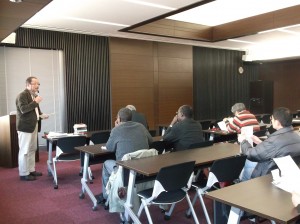
現代のアフリカ諸社会は、紛争によって解体・疲弊した社会秩序をいかにして修復・再生させるのか、争いのあとで人びとはどのように和解できるのかという課題に直面しています。この講演会では、こうした現実的な課題に対処するために、アフリカ人がみずから創造・蓄積し、運用してきた知識や制度がどのように活用できるのかを考えます。
アフリカは紛争解決能力があるのか
松本仁一(朝日新聞特別企画顧問)
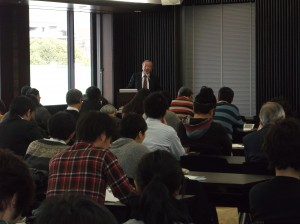
□結論からいうと「ある」
□例:ソマリランド(280万人)
・80年代半ば、内戦が始まる。1991年バーレ政権崩壊。
・ソマリランド内部の武力抗争は続く。約20の氏族。5万丁のカラシニコフ。
・93年、ボロマ地区の氏族長老が和平会議を呼びかけ。
・長老82人が銃を手放すことを呼びかける。民兵は警察と軍に。
・国連が注目。UNDPが銃回収方法を担当。
・02年までに民間の銃はほぼ回収。
・市場、女性ばかり。治安に信頼。
・ただ、ソマリランドは「単一民族国家」――共通の利害感覚を持てる。
□問題は多部族国家:コンゴ民主共和国、ウガンダ北部、チャド、ジンバブエ
・経済が崩壊――食えない――部族に依存――部族優位社会に。
・部族パトロンはクライアントを養うためにワイロを取る――国家経済崩壊へ
□多部族社会での対立解消は可能か――イエス。
・部族を超える価値観を持つこと。「独立闘争」の時代は部族対立は目立たなかった
・部族に頼らなくても食える社会。働けば食べられる社会がそれに代わる。
□政府に任せておいたらいつまでも「利益誘導型」でだめ
・「働けば食える」「もっと働けばもっといいことがある」のインセンティブを。
・ジンバブエのORAP。インセンティブを持つ。
・南アの対モザンビーク、対タンザニア投資。雇用と労働の質の向上。
・経済合理主義を民間主導で持ちこむ実験中。OSR。
□一筋縄ではいかない。しかしやってみる価値はある。
エチオピアにおける法の多元性と慣習的な裁判(Legal Pluralism and Customary Courts in Ethiopia)
インティソ・D・ゲブレ(アジス・アベバ大学)
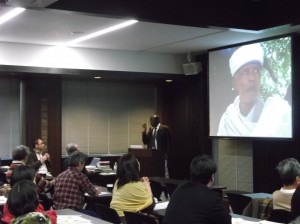
エチオピアには法の多元性がある―通常の公式な裁判と非公式で慣習的な裁判の二つが併存しているのである。家族内で発生する問題は、公式な裁判以外の場で取り扱われることが多いし、また、イスラーム教徒同士の争いはイスラーム法に則した裁判所で審議されることが多い。これとは異なり、伝統的なメカニズムによって人びとのあいだの争いが解決されたとしても、それは国家の法によって承認されることがない。しかしながら最近の調査によれば、農村で生活する人びとの大部分は、紛争解決の手段として、公式な裁判よりも慣習的な裁判を好む傾向があり、それは、都市部に住む人びとの多くにもあてはまることが明らかになっている。
これまでは、慣習的な紛争解決のメカニズムは「遅れたものである」と考えられてきたし、そうした慣習を廃止して、明文化された近代的な法律に移行しなければならないとされてきた。しかしながら現在、こうした伝統的なメカニズムが妥当なものであることが認識されるようになった。そして近年には、国家の法律では解決しにくい紛争は慣習的な裁判によって処理することを、政府が推奨するケースが多くなっている。
しかし、慣習的な紛争解決のメカニズムにはいくつかの欠点がある。すなわち、人権侵害がおこったり、女性や若年層が審理のプロセスから排除されることが批判されている。そのために伝統的な裁判は、エチオピアが批准しているさまざまな国際的な手段とは調和しない、という議論がある。また、一部の地域では、殺人事件のような重大な犯罪が慣習的なシステムによって裁かれているし、村レベルの裁判によって死刑が求刑される事例もある。そのために非公式な裁判システムは、公式な裁判と衝突するようになる。
この講演では、伝統的な裁判が妥当である理由は何なのか、どうして伝統的な裁判が好まれているのかを説明する。そして、こうした傾向は好ましく見えるが、それはどのような意義をもつのか、また、慣習的な裁判を利用するためには、どのような課題があるのかを論ずる。
Legal Pluralism and Customary Courts in Ethiopia
Yntiso D. Gebre (Addis Ababa University)
In Ethiopia, plural legal systems exist: the formal (regular) court and the informal (customary) court. With the exception of family matters that may be handled outside of the regular court and disputes between Muslims that may be taken to the Sharia court, conflicts resolved through other traditional mechanisms lack legal recognition. However, research reveals that most people in rural communities and many people in urban areas prefer the customary courts over the formal law for all forms of disputes.
In the past, the customary dispute resolutions mechanisms were considered backward practices that need to be replaced by the modern codified law. Today, there exists a growing recognition of the relevance of traditional conflict resolutions. In recent years, it became evident that sometimes government authorities encourage customary courts to address conflicts that could not be resolved through the state machinery.
Customary dispute resolution institutions are not without blemishes, however. Some are criticized for violating human rights and for excluding women and the youth from participation in hearings. This places traditional courts at odds with the international instruments that Ethiopia has signed. There are also instances, in some localities, where customary courts handle hard crimes such as homicide and even pass death sentences at the village court level. This is another source of confrontation between the formal and informal systems.
In this presentation, I will explain the reasons why the traditional courts remain relevant and in some cases even dominant; the manifestations of the recent seemingly favorable trend and its implications; and the challenges associated with the use of customary courts.
[生業・環境ユニット第6回研究会]目黒紀夫「『共存』に回収されるマサイ?―〈抵抗〉と〈歓待〉が交錯するケニア南部の野生動物保全の現場から」(第4回アフリカ自然保護研究会との共催、2013年1月25日開催)
時 間:2013年1月25日(金)15時30分~
場 所:稲盛記念館 小会議室2
プログラム
15:30-17:00 目黒紀夫(東京大学)
「『共存』に回収されるマサイ?―〈抵抗〉と〈歓待〉が交錯するケニア南部の野生動物保全の現場から」
要旨
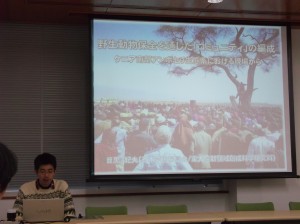
アフリカの野生動物保全をめぐっては、1990年代以降、コミュニティ志向のアプローチが各地で展開されている。だが、具体的な政策やプロジェクトの形成段階に地域社会が参加できているとは言い難く、外部主体の保全の取り組みに地域社会が抵抗する事例は歓待や協働と並んで報告されてきた。そこにおいて地域社会も外部世界も現実には決して一枚岩的な集団ではなく、複数の地域住民と複数の外部者との間で同時並行的かつ競合的に複数の関係が築かれている状況を踏まえるならば、抵抗や歓待の行為主体とされる「地域社会(コミュニティ)」が今日いかにして組織・編成されているのかを再検討することも重要な課題である。
本報告ではケニア南部アンボセリ生態系のマサイ社会を対象に、国会的・国際的に推し進められる「共存」を目指した保全政策に対して、同時期に発生した2つの事例を取り上げる。一つ目の事例ではバッファローが少年を殺したことをきっかけに数百人の戦士が野生動物を殺害して回り、最終的に「コミュニティ」と政府とが国立公園の管理をめぐって話し合いを行うこととなった。一方、それとほぼ同時期に起きた二つ目の事例では地域住民が私費を投じて保全プロジェクトを開始、白人観光業者を「保全のリーダー」と称賛しつつ多様な外部組織は「コミュニティ」と協力して保全を進めるべきだとの主張が「コミュニティ」側から提起された。一見したところ2つの事例は〈抵抗〉と〈歓待〉という形で極めて対照的な出来事に見える。だが、「コミュニティ」が自らを野生動物と「共存」してきた存在として自己(集団)表象し外部者に何らかの要求を突き付けたという点で共通しており、政策目標である「共存」に「コミュニティ」が従来以上に同意しているかのようにも見える。この点について本報告では、そこにおける「コミュニティ」レベルの自己表象と具体的な行動がどのように形成されているのかを検討することを通じて、「地域」と「外部」といった空間的二分法が無効化している現状であればこそ大多数の地域住民の意向に反する形で「共存への回収」が進行している事態を明らかにする。
[南部アフリカ・クラスター第4回研究会/第10回公開ワークショップ]村尾るみこ「アフリカ農民の創造性―ザンビア西部州アンゴラ移住民の生計戦略」(第193回アフリカ地域研究会との共催、2013年1月24日開催)
日 時:2013年1月24日(木)15:00 ~ 17:00
場 所:京都大学稲盛財団記念館3階大会議室
プログラム
「アフリカ農民の創造性―ザンビア西部州アンゴラ移住民の生計戦略」
村尾るみこ(東京外国語大学アジア・アフリカ言語文化研究所、研究機関研究員)
要 旨
アンゴラ移住民は、紛争を理由に南部アフリカのザンビア西部の農村に滞留する自主的定着難民である。彼ら/彼女らは、故地であるアンゴラからザンビアへの移住後、ナショナル・グローバルレベルでの政治経済変化のなかで土地利用などに関する制約を受けている。本講演では、アンゴラ移住民の生計戦略にみられる創造性に注目し、政治経済変動下のアフリカ農民にみられる諸特徴を検討する。
[第10回公開ワークショップ/南部アフリカ・クラスター第4回研究会]村尾るみこ「アフリカ農民の創造性―ザンビア西部州アンゴラ移住民の生計戦略」(第193回アフリカ地域研究会との共催、2013年1月24日開催)
日 時:2013年1月24日(木)15:00 ~ 17:00
場 所:京都大学稲盛財団記念館3階大会議室
プログラム
「アフリカ農民の創造性―ザンビア西部州アンゴラ移住民の生計戦略」
村尾るみこ(東京外国語大学アジア・アフリカ言語文化研究所、研究機関研究員)
要 旨
アンゴラ移住民は、紛争を理由に南部アフリカのザンビア西部の農村に滞留する自主的定着難民である。彼ら/彼女らは、故地であるアンゴラからザンビアへの移住後、ナショナル・グローバルレベルでの政治経済変化のなかで土地利用などに関する制約を受けている。本講演では、アンゴラ移住民の生計戦略にみられる創造性に注目し、政治経済変動下のアフリカ農民にみられる諸特徴を検討する。
[第2回アフリカの紛争と共生 国際フォーラム(ハラレ)](2012年12月07-09日開催)
日 時:2012年12月7〜9日
場 所:ハラレ Bronte, The Garden Hotel
概要
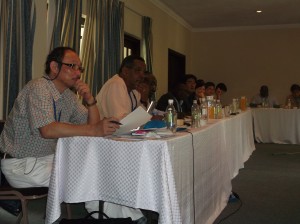
本プロジェクトでは「アフリカ紛争・共生フォーラム」を毎年1回、アフリカで開き、アフリカ諸国の研究者や実務者とともに国際的な議論を深めてゆきます。初年度の2011年12月には第1回の集まりをナイロビで、2012年12月には第2回をハラレで開催しました。
ハラレ・フォーラムでは、南部アフリカを対象として研究を続けてきたアフリカ人8人(基調講演をふくむ)と日本人7人の口頭発表がありました。また、前回のナイロビ・フォーラムが対象としたのは東アフリカ地域ですが、そのフォーラムに出席したアフリカ人3人、日本人4人もハラレ・フォーラムに参加しました。そして、紛争解決と共生の実現のために活用できる「アフリカの潜在力」とは何かについて、多様な視点から活発な意見交換がおこなわれました。
ハラレ・フォーラムでは、前回のナイロビ・フォーラムの成果をふまえて、参加する人びとには、まえもって以下の五つの質問を送りました。そして参加者には、自分の調査地での経験をもとにしながら、この質問に答えるかたちで2000~3000語のメモを用意してもらいました。そして、それをもとにして焦点の定まった議論をすることを試みました。
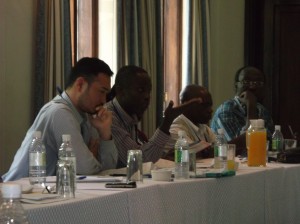
- 紛争の解決や社会的な和解と癒しのために有効に利用することができる「アフリカの潜在力」とは何か。「アフリカの潜在力」とはあいまいで多面的、かつ問題のある概念でありうるし、保守的、リベラル、あるいはラディカルなイデオロギーを内包しうる。また、この概念を南部アフリカのコンテクストで使うと、「誰がアフリカ人なのか」という、より基礎的な問題も提起するかもしれない。
- 「アフリカの潜在力」は、紛争解決の過程において、どのように機能しうるか。
- 紛争解決と正義の実現のためには、グローバルで普遍的なシステムが利用されることが一般的であるが、「アフリカの潜在力」は、そうしたシステムとどのように接合できるのか。
- 「アフリカの潜在力」には「有害な伝統的な慣行」がふくまれることもある。「アフリカの潜在力」を再評価して活用しようと考えるときに、どのようにして普遍的な正義という基準を満たし、人権を保護しうるのか。
- 南部アフリカの紛争パターンに、アフリカのほかの地域とは異なった独自のものがあるとしたら、それはどのようなものか。
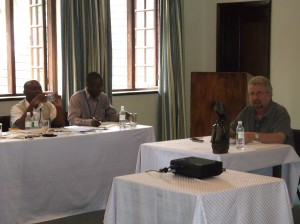
- What are African Potentials that can be utilized for conflict resolution, reconciliation and social healing? (the concept of African Potentials could be ambiguous, multifaceted and problematic including conservative/liberal/radical ideologies. It might raise a more fundamental question about who Africans are in Southern African context.)
- How can they work in a conflict resolution process?
- How can African Potentials be articulated with global/universal system of justice and conflict resolution?
- African Potentials may include “harmful” ones. How can pro-African Potentials orientations satisfy both of local and universal justice and protect human rights at once in addressing such “harmful traditional practices”?
- What are unique conflict patterns, if any, in a Southern African context that are different from those in other African regions?
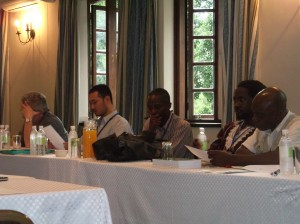
ハラレ・フォーラムのプログラムは、下記のとおりです。まず、研究代表者の太田至が趣旨説明をおこなったあと、アジスアベバ大学のインティソ・ゲブレさんから、前回のナイロビ・フォーラムやこの研究プロジェクト全体に関する批判的なコメントをいただきました。そのあと、CODESRIA(Council for the Development of Social Science Research in Africa: アフリカ社会科学調査振興評議会)の元会長で世界の農地改革に関する先鋭的な研究者であるサム・モヨさんの基調講演がありました。この講演でモヨさんは、アフリカ大陸における農地問題の現代史を概観して、その多様性といくつかの共通点を指摘し、また、南部アフリカにおける紛争の特徴を論じて、フォーラム全体の議論の方向を設定しました。
そのあと、5つのセッションにわかれて合計14件の口頭発表がありました。そこで取り上げられた事例は、農地改革(land reform)、土着の権利(autochthony)、主権の分有(power sharing)、地域内協力(regional cooperation)、人びとの和解と社会的な癒し(reconciliation and social healing)、日常的な紛争解決の方法(everyday conflict settlement)、精神世界の役割(spirituality)など、多岐にわたりました。そして参加者たちは、紛争の解決と共生の実現にむけて「アフリカの潜在力」をどのように活用できるのか、そして、南部アフリカに特徴的な現象とは何かについて、活発な議論をかわすことができました。
以下に掲載するのは、こうした口頭発表と議論から導き出された論点をまとめたものです。フォーラムの最後の総合討論では、この論点を参照しながら議論をかわしました。また、フォーラムの参加者たちは、成果の出版にむけて口頭発表の原稿を改訂することにしました。
議論された主要な課題(英文はここをクリック)
1.南部アフリカには、この地域独自の紛争のパターンがあるのか、また、あつかうべき独自の問題があるのか
- ヨーロッパ人入植者の問題、植民地主義、人種差別主義、資本主義の浸透(ネオ・リベラルなグローバル化の背景)
- 先住民からの土地の強奪といった暴力行使な歴史が重要な位置にあること
- 土着の人びとの権利(autochthony)、人びとの移住と多層をなす歴史、マイノリティの不安定な立場
- ネオ・リベラルな改革に対して、現地の権利を擁護する政治的・経済的ナショナリズムがおこっていること
- 「グッド・ガバナンス」および「伝統的価値」に対する二極化した見解、ハイブリッドな制度とは何か
- 外部のコンテキスト:安全保障と資源の争奪
2.紛争解決と共生を実現するために機能している「アフリカの潜在力」とは、どのようなものか
- 交渉のすえに合意すること:それに関与する者は、特定のアイデンティティを共有するような実体のある集団なのか
- 祖先に対する尊敬と歴史の所有者の問題:誰のための、誰にとっての歴史なのか
- 人間と自然に対する関係論的な見方:その開放性
- 地域に根ざした考え方、地域内部からの視点:文化的なアプローチとポリティカル・エコノミーのアプローチ
- 常に構築され、インベントされ続けること:それは実体をともなうのか、イメージのうえのことに過ぎないのか
3.紛争解決と共生を実現するにあたって「アフリカの潜在力」は、どのような局面で活用できるのか
- プロセスが重要であり、歴史との関連を見る必要がある。また、多層な焦点を考える必要がある(村、地方、国家、大陸、地球全体といった異なるレベル)
- 土地改革
- 生態及び資源管理
- (国民的)アイデンティティの表出、過去におこなわれた不正への対処
- 権力の分有、リージョナルな仲裁、紛争後の和解
- そのほかの議論すべき諸関係:階級間の関係、ジェンダー、家父長制など
- いつ、そしてどのような方法によって、「アフリカ潜在力」がうまく活用されたと判断するのか、そもそも、そのような測定ができるのか
4.慣習的でローカルな実践と公式なメカニズム(国家、リージョナルな組織など)をどのように接合することができるのか
- チーフの役割:それは制度化されるべきか。どの程度まで、どんな方法で?
- ふつうの人びとのエージェンシーについてどう考えるか:彼らの声は、どのようにして他者にとどくのか
- 国家による干渉:「捕捉されない」農民というとらえかた
- SADCは共同体として機能するのか:地域紛争、地域の治安体制、保護体制
- (普遍的)権利と(ローカルな)伝統の関係:両者の有害さ、両者の有用性、そして両者を複合したときの有害さと有用性
5.「アフリカの潜在力」と「アジアの潜在力」の共通点はどこか
プログラム
December 7 (Fri.)
- 19:00 – 20:00 Registration
- 20:00 – 22:00 Reception (Restaurant Emannuels)
December 8 (Sat.)
- 9:15 – 9:30 Itaru Ohta (Kyoto University)
- Introduction: Purpose of the Harare Forum
- 9:30 – 9:45 Gebre Yntiso (Addis Ababa University)
- Comments on the Nairobi Forum held in 2011
- 9:45 – 10:15 Keynote Speech:Sam Moyo (African Institute for Agrarian Studies)
- African Potentials: Southern Africa’s Conflict Regime
- 10:15 – 10:35 Break
- (1) 10:35 – 11:05 Donald Chimanikire (University of Zimbabwe)
- Zimbabwe’s discourse of national reconciliation and conflict resolution: The cases of Reconciliation, The Unity Accord, The Global Political Agreement (GPA) and National Healing
- (2) 11:05 – 11:35 Grasian H. Mkodzongi (University of Edinburgh)
- Land reform, land conflicts and the dynamics of authority after land reform in Zimbabwe 2000–2011
- (3) 11:35 – 12:05 Kazuhito Suga (I-i-net, Japan)
- Effect of African potentials on conflicts after Fast Track Land Reform in Zimbabwe –
- 12:05 – 12:15 Comments on the Session 1
- Gebre Yntiso (Addis Ababa University)
- 12:15 – 14:00 Lunch
- (4) 14:00 – 14:30 Yoich Mine (Doshisha University)
- Sharing and dispersing power in the African perspectives: A research note on African Potentials
- (5) 14:30 – 15:00 Yoko Nagahara (Tokyo University of Foreign Studies)
- History as an African Potential: ¬Conflict and Reconciliation in Relation to Namibia’s Colonial Past
- (6) 15:00 – 15:30 Mitsugi Endo (University of Tokyo)
- African Potentials in the context of Southern Africa
- 15:30 – 15:40 Comments on the Session 2
- Edward Kirumira (Makerere University)
- 15:40 – 16:00 Break
- (7) 16:00 – 16:30 Rumi Umino (Tokyo Metropolitan University)
- Living with conflicts: Being “indigenous” in South Africa, and beyond
- (8) 16:30 – 17:00 Lungisile Ntsebeza (University of Cape Town)
- Resolving conflict and ensuring peaceful co-existence in South Africa: Any role for land?
- (9) 17:00 – 17:30 Toshihiro Abe (Otani University)
- Lawyer Mandela’s court tactics and the potential function of the South African TRC
- 17:30 – 17:40 Comments on the Session 3
- Eisei Kurimoto (Osaka University)
◎Session 1: Dynamics of Conflict Resolution in Zimbabwe
◎Session 2: Power-Sharing, Mediation and Reconciliation in Southern Africa
◎Session 3: Peopling and Conflict Resolution in South Africa
December 9 (Sun.)
◎Session 4: Land and Conflict in Zambia
- (10) 9:15 – 9:45 Richard Zulu & Chileshe L. Mulenga (University of Zambia)
- Conflict resolution: Lessons from Zamba
- (11) 9:45 – 10:15 Shuichi Oyama (Kyoto University)
- The People’s anger killed a chief and his spirit protects the territory: Inequality and local resolution of land allocation under the new 1995 Land Act in Zambia
- 10:15 – 10:25 Comments on the Session 4
- Kennedy Mkutu (United States International University)
- 10:25 – 10:45 Break
- (12) 10:45 – 11: 15 Wilbert Sadomba (University of Zimbabwe)
- Potential of African philosophy in conflict resolution and peace-building
- (13) 11:15 – 11:45 Euclides Gonçalves (Centro de Estudos Sociais Aquino de Bragança)
- The politics of persuasion: The influentes and the conflict resolution in Mozambique
- (14) 11:45 – 12:15 Michael Neocosmos (University of South Africa)
- Thinking the Resolution-of-Contradictions-Among-the-People in Africa and the politics of social healing (some theoretical notes)
- 12:15 – 12:25 Comments on the Session 5
- Motoji Matsuda (Kyoto University)
- 12:25 – 14:00 Lunch
- 14:00 – 16:00 General Discussion (Chair: Yoich Mine)
◎Session 5: African Potentials in Perspectives
[西アフリカ・クラスター第4回研究会 & 政治・国際関係ユニット第6回研究会]Kate Meagher「The Strength of Weak States?: Hybrid Governance and Non-State Security Forces in Nigeria and the Congo」(2012年11月9日開催)
日 時:2012年11月9日(金)18:00~19:30
場 所:東京大学駒場キャンパス18号館4階コラボレーションルーム3
プログラム
18:00~19:30
Kate Meagher (London School of Economics and Political Science)
ケート・ミーガー(ロンドン政治経済学院)
“The Strength of Weak States?: Hybrid Governance and Non-State Security Forces in Nigeria and the Congo”
「弱い国家の強さ―ナイジェリアとコンゴにおけるハイブリッドなガバナンスと非国家保安部隊」
要旨
This lecture will look at whether non-state security forces (vigilantes, militias, etc.) can provide a second-best source of security in fragile regions. It starts with a critique of new ‘hybrid governance’ approaches to state-building, which encourage the integration of informal security arrangements into state structures. This sets the scene for a comparative analysis of the Bakassi Boys of Nigeria and the RCD-ML militia in the Eastern DRC, which challenges the notion that informal security arrangements necessarily enjoy local legitimacy, and raises questions about their potential for improving the governance context even if they start out as locally legitimate forces.
